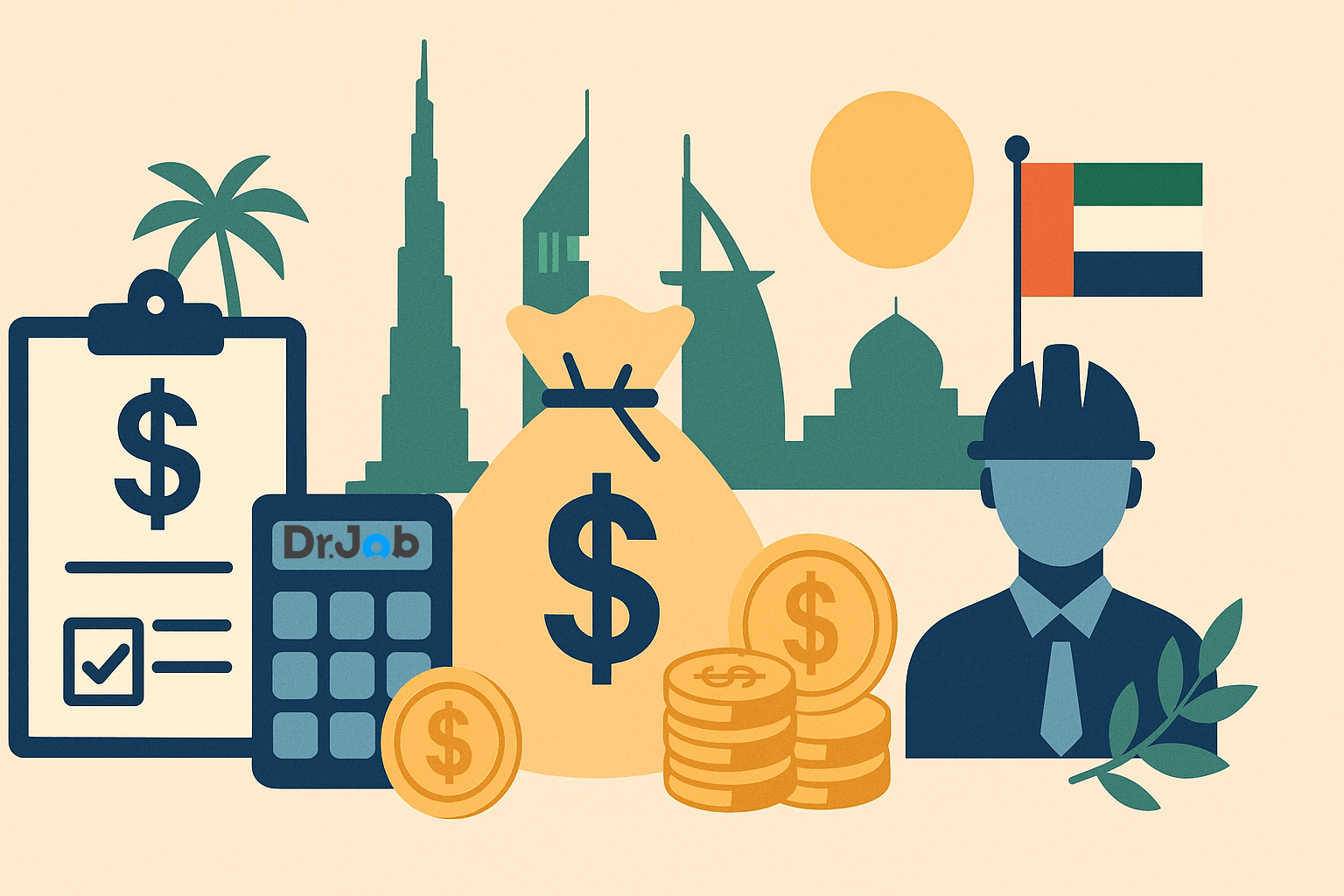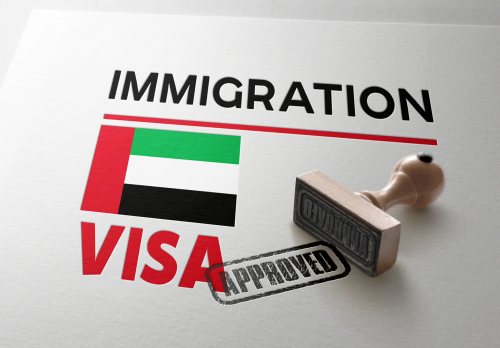For professionals considering a move to the UAE, job salaries in Dubai are an important factor. Understanding salary trends helps in making smart career resolutions, regardless of experience level.
Moreover, Dubai attracts job seekers from around the world with its growing industries and tax-free career income in Dubai.
On the other hand, several factors affect job salaries in Dubai, such as the cost of living, job demand, and negotiation skills.
For example, some sectors offer high salaries, while others provide average pay with additional benefits. Therefore, job seekers can plan their careers better with a clear understanding of the job market.
In this article, we will compare living costs, explore salary trends across industries, and discuss salary negotiation strategies. So, whether you are looking for an entry-level job or a high-paying position, this guide will provide the information you need.

Firstly: Which Sectors Offer the Best Job Salaries in Dubai?
Job salaries in Dubai vary significantly by industry. Some sectors offer generous compensation packages, while others maintain lower wages.
1. Finance and Banking – A High-Paying Sector
As Dubai is a global financial hub, the finance sector provides attractive salaries. For example, senior roles in investment banking can exceed AED 50,000 per month, while entry-level positions start at AED 15,000. Additionally, common benefits include bonuses and housing allowances.
2. IT Careers – What Job Salaries in Dubai Can Tech Experts Earn?
In recent years, the demand for IT professionals has grown due to Dubai’s digital transformation.
For instance, entry-level IT roles in Dubai start at AED 10,000, while experienced software developers and cybersecurity specialists can earn over AED 35,000 per month.
Moreover, many companies offer extra perks, such as stock options and flexible work conditions.
3. Healthcare – Job Salaries in Dubai for Medical Professionals
In the healthcare sector, doctors and other medical professionals in Dubai receive competitive salaries.
For example, depending on experience and qualifications, specialists can earn up to AED 45,000 per month, while general practitioners typically receive around AED 20,000.
Additionally, private-sector doctors usually earn higher salaries than those working in government facilities.
Secondly: Does Career Income in Dubai Cover Living Costs?
Understanding living expenses is essential when evaluating career income in Dubai.
1. Housing – The Biggest Expense for Expats
Rent is one of the largest costs in Dubai. For example, while homes in suburban areas are slightly more affordable, a one-bedroom apartment in the city center costs between AED 6,000 and AED 10,000 per month.
Therefore, to significantly reduce housing costs, many expats choose shared accommodation.
2. Transportation Costs – Are Job Salaries in Dubai Enough?
On the other hand, public transport in Dubai is reasonably priced. For instance, a monthly metro pass costs around AED 300.
However, many residents prefer owning a car, which adds fuel and maintenance expenses.
Additionally, despite their popularity, ride-hailing services like Uber and Careem can be expensive during peak hours.
3. Dining and Entertainment – Can You Afford a Comfortable Lifestyle?
Dubai offers diverse food options, from luxury restaurants to budget-friendly choices.
For example, food expenses for a small family range between AED 2,500 and AED 4,000 per month, while an average dinner costs around AED 50. As a result, residents can save significantly by cooking at home.
Thirdly: Salary Negotiation – Get the Career Income in Dubai You Deserve
Effective salary negotiation helps professionals secure better compensation packages.
1. Research First – What Are the Job Salaries in Dubai?
Above all, candidates should review the job salaries in Dubai for their industry before negotiating.
In fact, networking and online salary reports provide valuable insights.
Thus, professionals who understand average salaries can negotiate with confidence and secure fair pay.
2. Showcase Your Value – How to Justify Higher Job Salaries in Dubai
Professionals with specialized training or certifications have a stronger bargaining position.
In this context, companies in Dubai reward experienced candidates with higher salaries and benefits.
Therefore, during salary discussions, candidates can secure better offers by highlighting their achievements and relevant experience.
3. Beyond Salary – The Most Important Perks
Besides base salary, expats should negotiate benefits such as housing allowance, health insurance, and annual flight tickets. Clearly, these perks significantly enhance financial security.
Moreover, many companies offer relocation assistance, making it easier for foreign workers to transition smoothly to Dubai.
Fourthly: How Do Experience and Certifications Affect Job Salaries in Dubai?
In general, both experience and certifications play a key role in determining career income in Dubai. Salaries increase as professionals gain experience.
1. How Does Experience Impact Career Income Growth in Dubai?
On the other hand, experience boosts salaries. Thus, professionals with over ten years of experience can earn more than 30,000 AED, while entry-level employees may earn between 8,000 and 12,000 AED.
Additionally, senior managers often receive significantly higher salaries due to their leadership roles.
2. The Role of Certifications in Boosting Job Salaries in Dubai
Moreover, career income in Dubai can increase with certifications like CFA (Financial Analysis) or PMP (Project Management).
In many cases, employees with recognized qualifications earn 10% to 30% more than those without certifications.
For this reason, many companies in Dubai prioritize professionals with international credentials.
3. High-Demand Skills in Dubai’s Job Market
At the same time, some skills are in high demand, such as leadership skills like team management and technical skills like programming and data analysis.
Since companies compete for qualified talent, professionals with specialized knowledge typically secure higher salaries and better compensation packages.
Fifthly: How Do Company Policies Affect Job Salaries in Dubai?
Since companies follow internal pay scales, employee benefits, and industry standards, their policies determine job salaries in Dubai.
1. Multinational vs. Local Companies – Who Pays More?
In general, multinational companies in Dubai offer higher salaries than local firms.
Additionally, these companies provide competitive salary packages, including stock options and performance bonuses.
On the other hand, local companies offer extra benefits such as housing allowances or flexible work schedules.
2. Contract Type – How Does It Affect Job Salaries in Dubai?
Typically, full-time employees in Dubai receive higher career income compared to contract workers or freelancers.
Similarly, permanent contracts provide greater financial stability than temporary contracts since they include medical insurance, annual leave, and end-of-service benefits.
3. Performance-Based Raises – How to Get a Salary Increase?
On the other hand, employers in Dubai offer salary increases based on performance evaluations.
Additionally, employees receive bonuses or annual raises when they meet or exceed their targets.
Therefore, employees can negotiate performance-based raises to boost their earnings.
To sum up, understanding job salaries in Dubai is essential for making wise career decisions.
Dubai offers competitive salaries and tax-free career income, but earnings vary based on industry, experience, and negotiation skills.
With this in mind, professionals can maximize their career income in Dubai and enjoy a comfortable lifestyle by researching market rates, estimating living costs, and negotiating effectively.
Now, do you want to achieve a higher income in Dubai? Start today by improving your skills and exploring opportunities that match your experience and ambitions.








 2025-08-22
2025-08-22
 2025-08-22
2025-08-22
 2025-07-02
2025-07-02
 2025-03-17
2025-03-17
 2023-02-02
2023-02-02